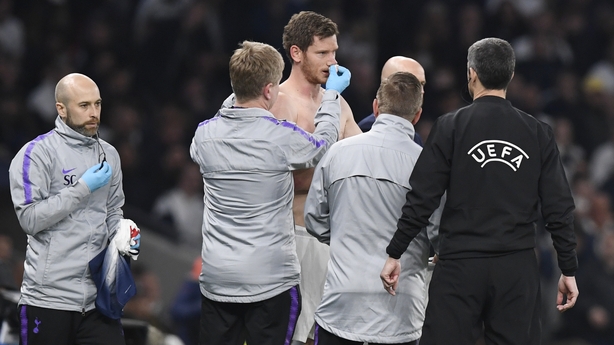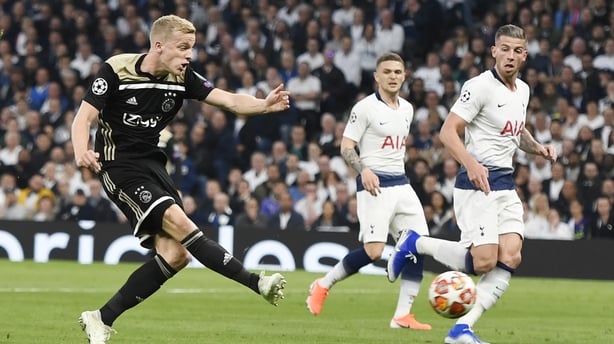Tottenham manager Mauricio Pochettino said the club doctors had deemed it possible for Jan Vertonghen to continue playing after the head injury he suffered shortly before half-time in Tuesday night's Champions League semi-final loss to Ajax.
The Spurs central defender collided with the back of teammate Toby Alderweireld's head as the pair contested an aerial ball in the Ajax penalty area.
Vertonghen was bleeding profusely after the clash and was soon led off the pitch by the team's medical staff but, after a brief assessment, it was decided he was fit to continue.
Referee Miguel Mateu Lahoz sought clarity from the Spurs medical staff that Vertonghen was fit to continue and following a discussion on the sideline, allowed the player to continue.
However, within a minute, a somewhat dazed looking Vertonghen signalled his need to come off, became very unsteady on his feet and had to be helped down the tunnel by the medics.
Speaking to Tony O'Donoghue on the RTÉ Soccer Social on Facebook Live, Spurs boss Pochettino said he always left such decisions with the club doctors.
"It's not my decision. It's the doctor's decision. The club doctors said it was possible for him to keep going.
"But after a few seconds, he asked to go off. In this type of situation, I'm clear that the decision is with the doctor."
(Pochettino interview from 15:20)
We need your consent to load this Facebook contentWe use Facebook to manage extra content that can set cookies on your device and collect data about your activity. Please review their details and accept them to load the content.Manage Preferences
Speaking on Facebook Live, RTÉ soccer analysts Didi Hamann and Richie Sadlier agreed there needed to be rule changes to deal with the concussion issue, with the former saying that temporary substitutions should be introduced to cater for it.
"When you are concussed and go back on the pitch and perhaps get another knock on the head, or head the ball, you could do some serious damage so I think it's time to do something about it," said Hamann.
"In football, it's probably not as easy because we don't get these incidents so often. In American football and rugby, they happen on a weekly basis and I understand there's a concussion sub that can come on for ten minutes. Is that possible in football?
"If you do something, you have to change the rules. Because to find out if someone is concussed, it probably takes eight, ten or twelve minutes and that's too long to play with a man down."

Sadlier pointed that effective protocols might meet resistance but it was nonetheless necessary to introduce them.
"I think it's potentially too serious not to (introduce tighter regulations)," said Sadlier. "I think you've got to be ballsy enough to introduce a protocol that some managers are going to be annoyed with. And some players and people will say, 'this is over-the-top, this is unnecessary.'
"But the flipside is you rule out not just scenes that we saw tonight, but potentially worse.
"Hopefully, he's okay in the dressing room tonight. For someone to be getting treatment for so long and to be under medical supervision for that long. And within about sixty seconds of going back on, he was dizzy, he's wobbling, he needed people to hold him up and he was vomiting.
"That scenario is allowed being happen at the moment. If they wanted it to change, they could change it at the weekend."

Speaking about his side's loss, Pochettino didn't subscribe to the idea that Tottenham struggled to cope with Ajax's pressing, arguing that the problems lay more with his own team.
However, he praised his side's reaction in the second half and sounded a somewhat more bullish note when discussing next week's second leg in Amsterdam.
"Our energy wasn't good. In terms of the approach of the game, they were better. They showed more energy than us. That was the key.
"In the second half, I think our reaction was good. We pushed them.
"I think it was our lack of capacity to play. They didn't press too high. We didn't find a way to play. I think we dominated the second half and pushed them to play deeper and allowed, as we saw, a few counter-attacks.
"Overall, I think we deserved a draw. The tie is still open. Our mentality is that we go to Amsterdam knowing we must win."

